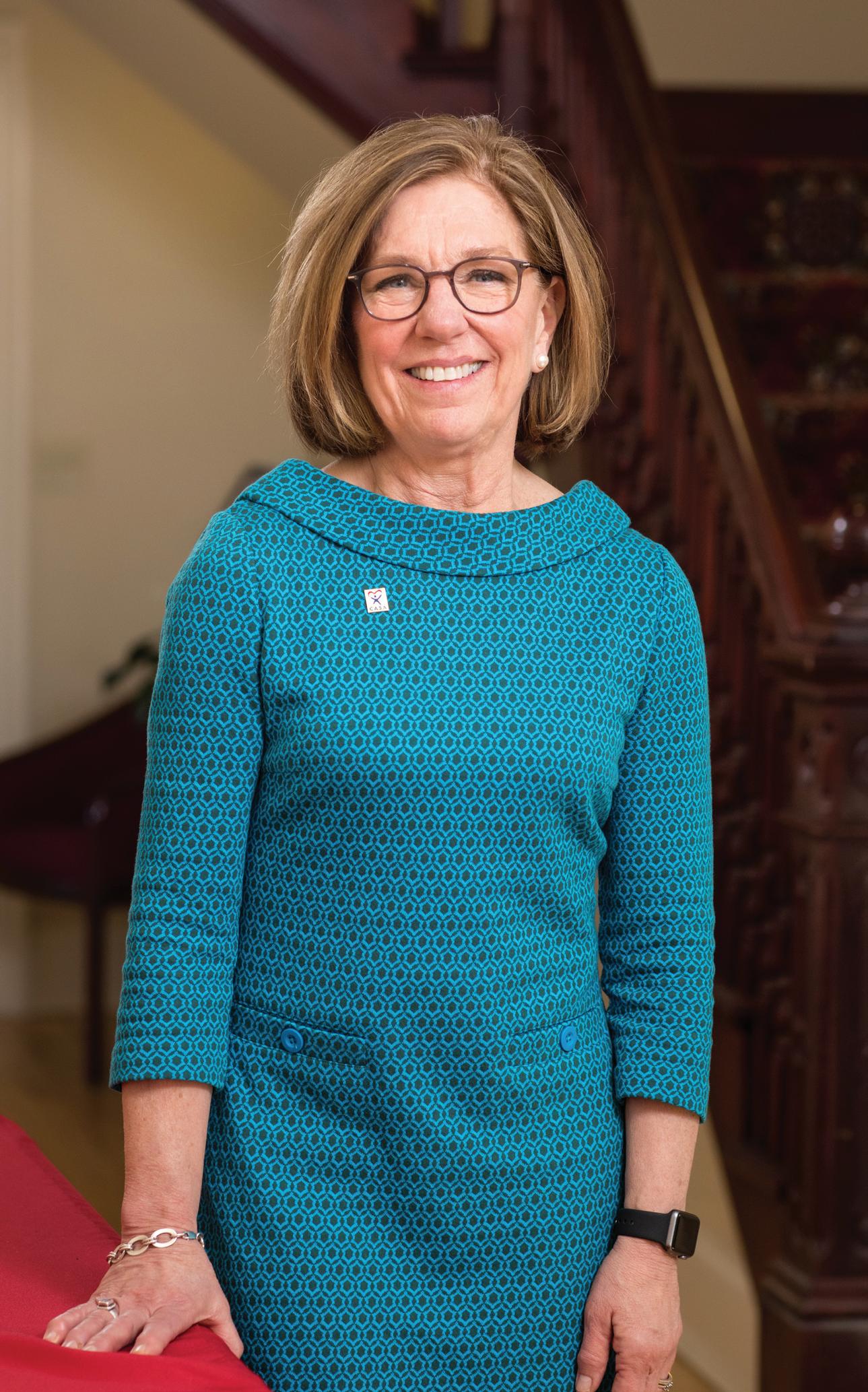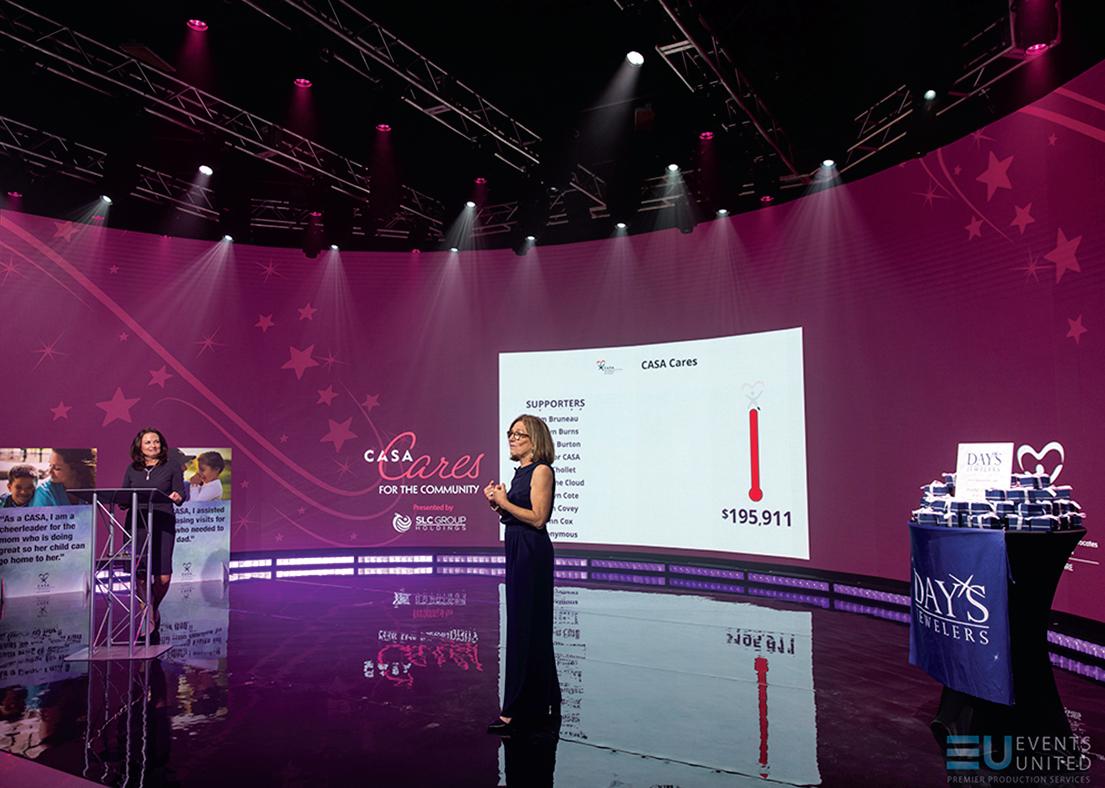
7 minute read
‘Not giving up’ to help the state’s at-risk children
Marty Sink and the tenacity and adaptability of CASA staff and volunteers
BY LIISA RAJALA
FOR MORE THAN 30 YEARS, Marty Sink and the network of staffers and volunteers at CASA (Court Appointed Special Advocates) of New Hampshire have forged ahead to ensure children’s voices are heard in court.
Sink’s personal experience with the foster care system prompted her to start up a New Hampshire chapter of the national organization, which trains and assigns volunteers to become guardians ad litem for children placed in foster care or whose parents are being investigated by the Division for Children, Youth and Families.
From navigating CASA of NH’s initial introduction to the New Hampshire court system to adapting its existing procedures during the Covid-19 pandemic, Sink and her team have seen how systemic changes generate better outcomes.
RISING TO THE CHALLENGE
Sink first was introduced to court-appointed guardians ad litem as a foster parent.
In the late 1980s and early ‘90s, guardians ad litem were typically attorneys who made recommendations to the court in a child’s best interest.
However, Sink saw they were not getting the full picture of the child’s well-being, as they didn’t have the time to speak to foster parents and other individuals who regularly interacted with the child.
“I knew the enormous caseloads both guardians and social workers were carrying, and the sheer volume didn’t allow them to do the personal touch work on these cases,” said Sink.
“This whole idea of bringing lay people into (the courts) was foreign, but clearly could meet a need,” said Sink, who called the National Court Appointed Special Advocate/Guardian ad Litem Association for Children to learn how to become a volunteer and was told, “‘New Hampshire doesn’t have a CASA program yet, but would you like to be involved in getting that started?’”

CASA Cares for the Community was CASA’s first virtual fundraiser, and it was a huge success. Raffles, the live and silent auctions, sponsorships and the appeal raised more than $200,000. The second annual CASA Cares virtual event will take place in September 2021. (Photo by Laura Thomason, Events United)
Sink, a college-educated mother whose background was in retail management and waitressing part time, had no legal expertise, but the national organization provided all of the training materials for volunteers to get started.
“There was a proven track record in other parts of the country that it could work and it could be successful,” said Sink, and so she got started with a very small staff – herself and one part-timer.
Pretty immediately, she was met with significant resistance from local attorneys and social workers who opposed the idea of using volunteers in a highly protective, confidential area.
“The challenge for me was not giving up,” says Sink. “Because there were times it was really hard, where our state child protection agency thought the organization wasn’t very sophisticated.”
But, since the early days, Sink and her growing team have implemented a thorough screening process to ensure volunteers are appropriate and prepared for the courtroom.
There is a criminal background check, personal reference check, lengthy interview and 40 hours of pre-service training as well as continuing training.
“They (advocates) have standards they adhere to, both state and national, so their role is very clear and their guidelines keep them on this path,” explains Sink. “It’s not like a Big Brother-Big Sister role. They don’t become quasi-foster parents. They are appointed as an officer of the court, so they’re on a level playing field with our DCYF child protection worker. They have an equal role in court proceedings.”
CASA of NH was launched with two pilot programs in 1989, one in Manchester and one in Goffstown. The scrutiny was intense, but it was important to CASA of NH’s development in how it guided advocates to gather and deliver information.
“It forced us to keep looking – and we do to this day – how can we be doing it better or differently or more effectively to serve the courts better and ultimately serve the kids better?” recalls Sink, who admits, “in the early days, they weren’t sure we would survive.”
She says CASA advocates’ work was quickly identified by the judges as being a high value to the court, and so word spread, and CASA expanded into more courts as it fundraised resources.
“It was really the advocates bringing information to the court they hadn’t had, and making their decision process easier because they were getting relevant, timely objective information about these children and their families,” says Sink.
Volunteering as a court-appointed special advocate is a part-time job, says Sink, but volunteers have the ability to focus more thoroughly than professionals with overwhelming caseloads.
“When a CASA volunteer steps into this role, they’re limited to one or two cases at a time, so they can really get to know these kids, attend team meetings, visit with parents, visit the child or children on their cases at least once a month. They are attending every court hearing that involves the child and their parents, and reporting out to the court in those hearings what is in the child’s best interest,” says Sink.
Sink says feedback and support from New Hampshire judges helped the organization grow to a staff of 34 and more than 600 advocates today.
“They repeatedly said, ‘Thank you, we need this. We need this information we otherwise would not have so we can make better informed and more timely decisions for these children,’” she says.
And CASA of NH’s relationship with DCYF and other stakeholders improved as it demonstrated its role in the court system.
“Although we are not always on the same page – we aren’t always in sync in terms of recommendations we’re making to the court – what has developed is a professional respect for the very different roles that we play. We’re solely focused on the best interests of the child that frequently will involve looking at the entire family.”
ADAPTING DURING THE PANDEMIC
Designated an essential service, the courts and CASA never stopped or slowed down with proceedings around child abuse and neglect cases during Covid-19.
“I think the judges and the administration of the courts were really committed to ensuring we didn’t skip a beat for these kids who were awaiting permanency,” says Sink.
In adapting to the pandemic, CASA very quickly provided additional support and guidance to advocates regarding social distancing and connecting virtually with the kids they were advocating for through video chat, texting and speaking over the phone, to maintain that relationship that sets the stage for effective advocacy work.
The personal connection is a little harder to establish in new cases and has required more help from foster parents who are already managing virtual schooling for their foster kids, but Sink has seen both advocates and foster families making an effort to maintain contact with all individuals involved in a case, as well as regular virtual contact with the child’s biological parents.
“I’m amazed at the commitment from our volunteers and our staff,” says Sink. “Hundreds and hundreds of CASA volunteers around the state are doing this work every day. I’m blown away by their tenacity and adaptability.”
Always in need of more volunteer advocates, CASA quickly adapted its 40-hour, classroom-style pre-service training to a virtual format. The switch actually resulted in larger classes of engaged advocates who may have been hesitant before.
Unfortunately, Sink anticipates that when kids return to school, day care and other places with child-facing professionals, there will be an increase in reports of child abuse and neglect.
“Colleagues of mine throughout the country in various CASA programs and generally in the child protection system are afraid of what we will find. Hopefully, we’re all wrong, but we’re preparing for the worst and wishing for the best,” says Sink.
POSITIVE OUTCOMES
Being a CASA is not for everyone, and Sink acknowledges even her staff members have trying, emotional days. There is a counselor on staff for employees, and volunteers have six regional support groups with other fellow volunteers who can be a listening ear, as cases are not to be discussed at home with their spouses due to their confidentiality.
“We hear from our advocates they’re being exposed to a system they otherwise would have no reason to be exposed to. How this challenges their own lives is pretty profound,” says Sink.

CASA’s president and CEO, Marty Sink (right), presents “For the Child,” a painting by Richard Haynes, to Loon Mountain’s VP of Mountain Operations Andrew Noyes for 20 years of hosting Snowfest, an annual volunteer appreciation day for CASA advocates. (Photo by Kendal J. Bush)
Often substance misuse, mental health issues, poverty and food insecurity are the driving factors for investigation into a child’s well-being, and the Covid-19 pandemic may only have exacerbated those underlying triggers.
But, even with so many serious cases of child abuse and neglect, Sink says there are positive outcomes with the right community supports.
“We can’t just assume these are all bad people,” notes Sink.
New Hampshire law requires child protection professionals to look to reunification as the first option.
The goal, says Sink, is to strengthen families and get them the services they need, and if parents demonstrate an active role in getting help and improving, children belong with their families.
Approximately 60% of CASA’s cases end in reunification.
“What has kept me going is a passion for these kids and making sure their voices are being heard and they don’t get lost in the cracks and don’t spend their entire childhood bouncing from foster care to foster care,” says Sink. “We’ve come a long, long way in ensuring the need for permanency for these kids who enter our system through no fault of their own.”










